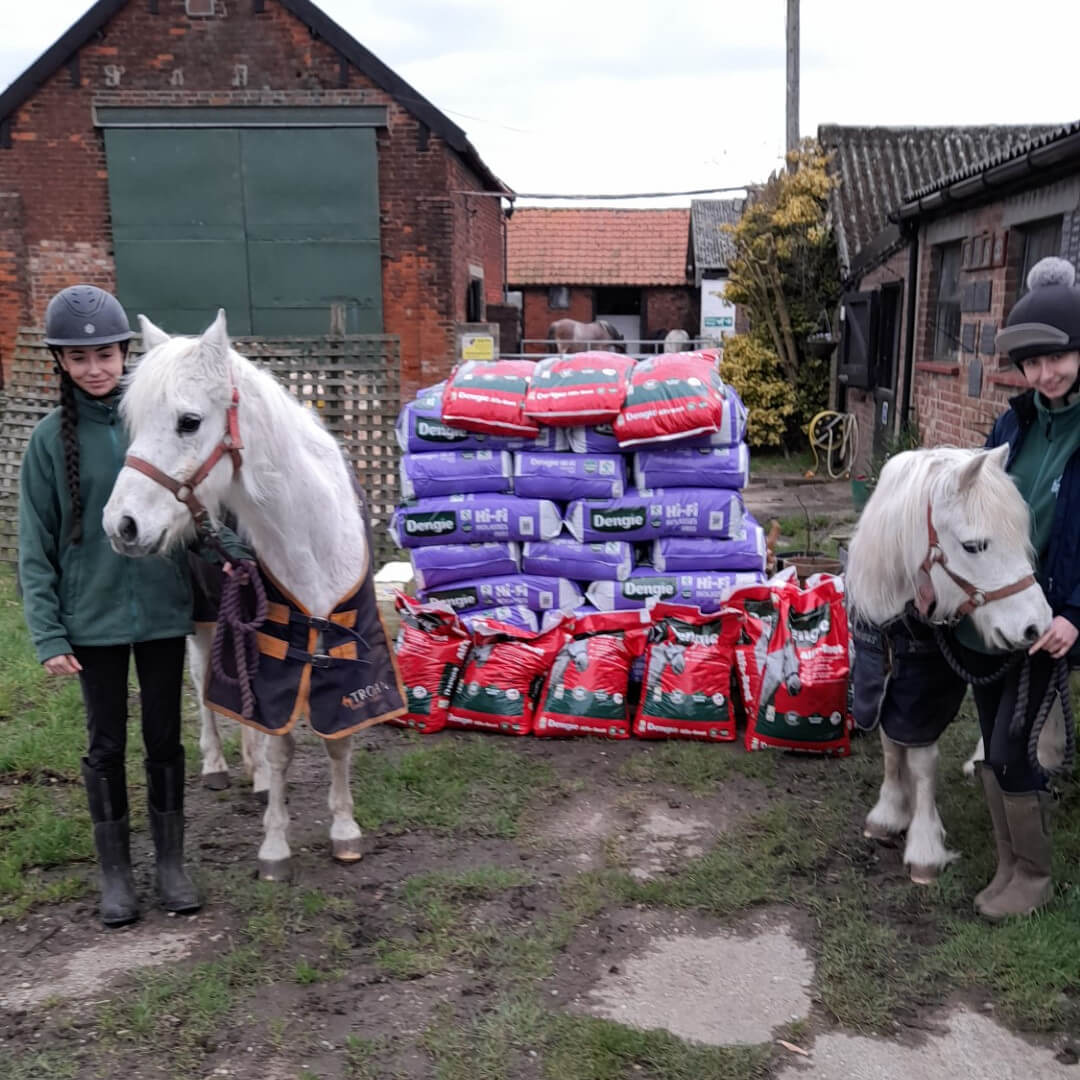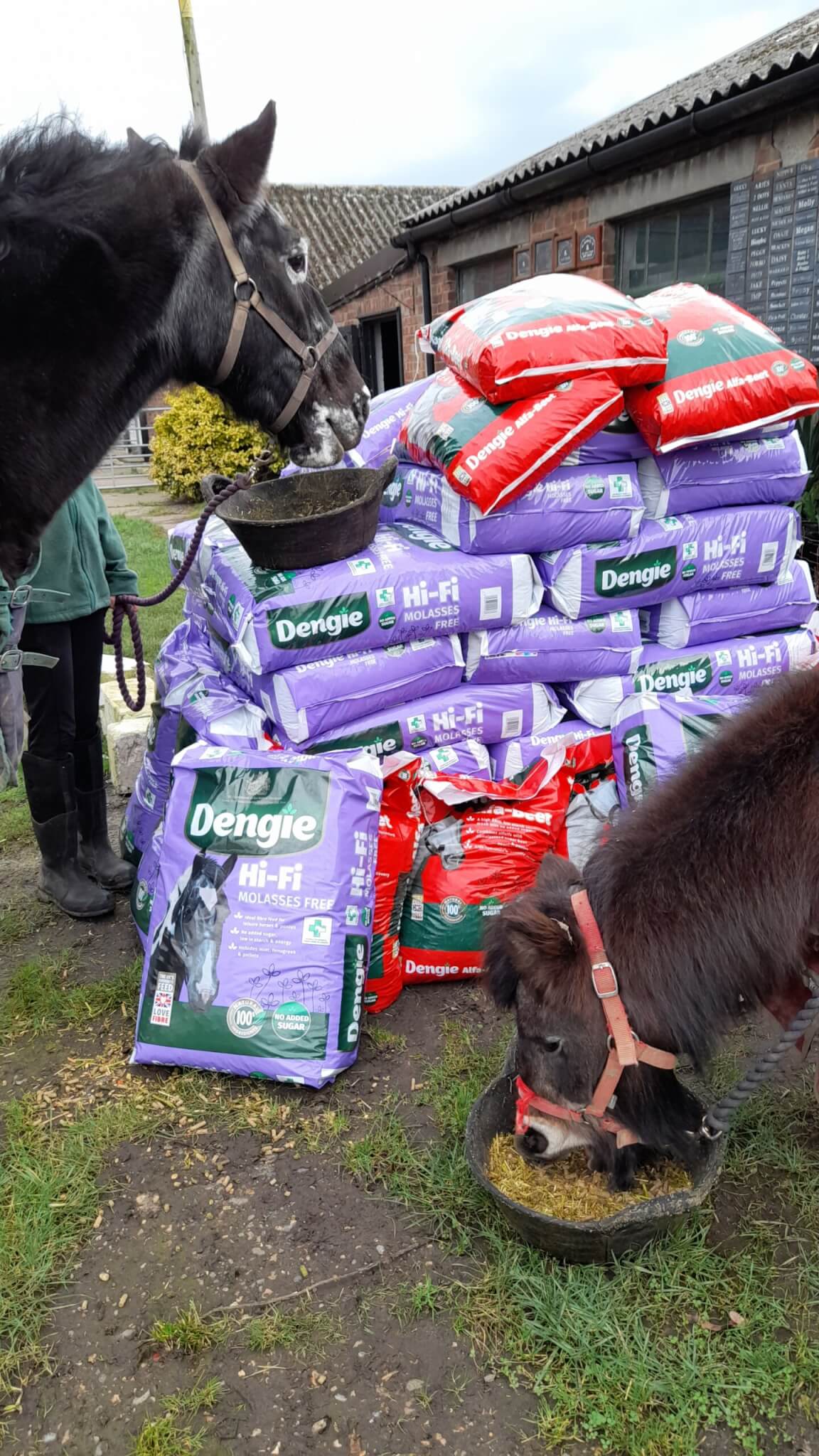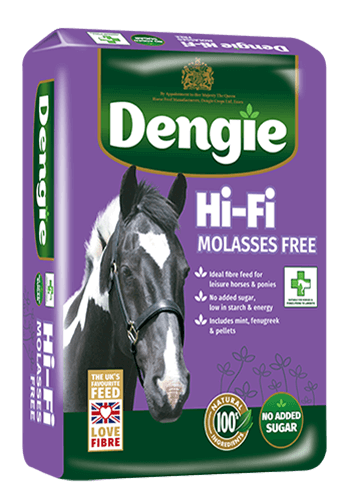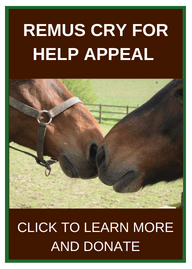


Winter Feed Donation from Dengie Horse Feeds
Dengie Horse Feeds, in collaboration with Essex Animal Feeds, has generously contributed feed to Remus Horse Sanctuary this winter. Our partnership with Dengie has flourished for over the past 15 years, during which time they have been steadfastly supporting us. Their assistance extends beyond material donations, encompassing valuable nutrition advice and thorough assessments of the horses’ diets.
This particular donation has been made at a time to support our Winter Hay Appeal.
The Dengie Hi-Fi Molasses Free and Alfa-Beet are fed to numerous horses, ponies and donkeys here at Remus, many of which have dietary-related issues such as PPID, EMS or poor dentition. The combination of high fibre feeds provides the horses and ponies with a low sugar and starch ration and can be easily eaten by those animals that struggle to chew.
The two greys pictured are Daisy on the left and Tiffany on the right, along with Minstral and the delightful little fella is Monty – he had 5 teeth out recently – they’re all busy tucking in! The Hi-Fi is a great hay replacer as none of them have good teeth (they’re in their late 30’s now) and the Alfa-Beet helps keep their weight at its optimum – and they love it!
“I have worked with the team at Remus for many years, they were actually one of the first places I visited when I joined the Dengie Nutrition team,” says Tracey Hammond, Nutritionist at Dengie. “For me, beyond helping the horses, I have found it very rewarding supplying Sue and her team with the tools to make decisions on what and how much to feed, which means it’s only the really tricky cases they need to consult me on now”.
When Dengie initially partnered with Remus, the Sanctuary homed a predominantly elderly equine population, many of whom faced dental challenges. Addressing the need for an alternative to hay that was suitable for these individuals was crucial for aiding weight gain and maintaining digestive health. Some horses participated in a Dengie-sponsored study conducted by Writtle College, examining the impact of poor dentition on forage consumption. The study revealed that horses with dental issues consumed two-thirds less food than their counterparts with healthy teeth. Introducing a fully soaked fibre source, Dengie Alfa-Beet, resulted in zero feed refusals, underscoring the importance of providing easily chewable fibre for older horses.
Over time, we saw a rise in younger horses prone to laminitis due to Equine Metabolic Syndrome (EMS). To accommodate these changes, we revamped our facilities, incorporating well-designed woodchip areas to manage horses with restricted or no access to grass.
“Our most sincere thanks to everyone at Dengie that arranged for delivery of the feed and to Essex Animal Feed for delivering it free of charge,” said Sue Burton, Founder of Remus Horse Sanctuary. “I can’t tell you how helpful that is especially whilst things are so tight. It really has made a huge difference and is so much appreciated by us all, as is all the help and support that we receive from Dengie”.
Amidst the current cost of living crisis, Remus faces heightened demands. Not only are the charity’s operational costs on the rise, but the requests for assistance with horses have also multiplied. Dengie’s contribution of Hi-Fi Molasses Free and Alfa-Beet, both widely consumed by the majority of the horses, has proven invaluable in easing this burden and we thank them for their ongoing support.
Dengie Horse Feeds is officially the UK’s favourite fibre-based horse feed, having topped the 2023 National Equestrian Survey*. The leading producer of fibre-based horse feeds using forages exclusively grown in the UK, Dengie has been growing alfalfa, one of the few ingredients grown specifically for horse nutrition, for over 50 years and continue to develop innovative and exciting feeds that promote health and performance in the horse. Alfalfa is a sustainable and environmentally friendly crop providing a natural habitat for birds, insects and other wildlife. All the crops are fully traceable from seed to feed; their non-GM status and feed management protocols set the standard in fibre feeding in the UK. Dengie offer non-biased qualified nutritional advice on feeding to horse owners and are proud to be awarded HM The Queen’s Royal Warrant.
*BETA National Equestrian Survey 2023 for fibre feed brands purchased in the last 12 months.
Click here if you would like to contribute to our Winter Hay Appeal.
Winter Feeding for a Calm and Healthy Horse
Winter isn’t without its challenges, and this includes keeping your horse healthy, happy and looking their best. Inevitably shorter days and dismal weather can mean reduced turnout, irregular exercise and less hacking opportunities to blow the cobwebs away. Feeding plenty of forage to keep the horse occupied when stabled for longer also means keeping an eye on your horse’s waistline.
Fibre and oil for a calm ride
For a calmer ride research has shown that feeding sources of slow-release energy from fibre and oil is key. Using a feed that supplies an appropriate amount of energy for a reduced workload will not only help with a calmer ride but also help to keep the waistline in check as well.
Dengie Hi-Fi Molasses Free combines chopped and pelleted alfalfa and straw with a light rapeseed oil coating, mint, and fenugreek for added tastiness. Hi-Fi Molasses Free contains very low levels of energy, sugar and starch making it ideal for horses at rest or in light work that need to watch their weight or can be excitable. Simply combine with vitamins and minerals to balance the ration.
Maintaining skin, coat and hoof condition
UK pasture and forage typically lacks the trace minerals copper, selenium and zinc and conserved forage also lacks vitamin E. Ensuring a balanced ration and adding some extra beneficial nutrients such as biotin can help with the environmental challenges to your horse’s skin, coat and hooves in the winter.
Healthy Hooves Molasses Free combines chopped and pelleted alfalfa and straw with a light rapeseed oil coating, vitamins, minerals, garlic and MSM. Healthy Hooves Molasses Free provides a balanced ration when fed at the recommended quantity and includes biotin at the level found in a hoof supplement. MSM, which is a bio-available source of sulphur, is also included as it is a key component of keratin for joint support as well as good hoof, coat and skin condition. Grass is the natural source of sulphur for horses and those on restricted grazing may benefit.
Managing weight and digestive health
We all know that trickle feeding is vital for digestive and behavioural health but in the domestic environment ad-lib forage feeding can often result in obesity. Choosing low calorie fibre sources is key for weight management and keeping the horse chewing.
New Dengie Ulser Lite combines oat straw with dried grasses, grass and alfalfa pellets with a light rapeseed oil coating, ADM Protexin in-feed formula, that combines prebiotic and live yeast, and herbal blend. At 8MJ/kg Digestible Energy Ulser Lite is a low-calorie fibre feed to support digestive health that can also be used to partially or totally replace the forage ration making it an ideal alternative when only more calorific forage like haylage is available.
Straw – a low calorie fibre source
Winter weight loss in good do-ers or overweight horses is a vital step to getting them to or keeping them at a healthy weight long term. In the UK our conserved forages such as hay and haylage can be too calorific when fed ad-lib and straw as a lower calorie fibre can be very useful to mix in the forage ration to keep a horse chewing without the calories. Some people are nervous regarding straw use, but research using straw to replace 50% of the haylage ration found no detrimental effects on digestive health. Furthermore, it helped to slow the overall rate of intake of the total forage ration which in turn lessened insulin response which is good news for those with insulin dysregulation.
Discover more at www.dengie.com.
Food for Thought
Many of the horses and ponies that find their way to us here at Remus arrive underweight and hungry. One of the ‘five freedoms’ that we choose to align our Horse Welfare Watch with is, of course, freedom from hunger or thirst. With us, these horses and ponies are free to live a safe, happy life and regularly enjoy a bucket of their favourite dinner!
We all know the way to our horses’ hearts is through their stomachs, but sometimes it’s tricky to know what we should be feeding, how much and how often. With winter more or less upon us, you may have started to reassess your horse’s diet in preparation for the colder weather. This article from Horse & Hound looks at how to feed your horse what he needs, while keeping an eye on what you’re spending.
You may also like to take a look at our winter feed appeal, which will help us to feed the horses and ponies that have no one to care for them.
Here comes Autumn…
The nights are drawing in, the stubble fields have been ploughed back over and the winter rugs are coming out of storage…yes, summer is officially over! But what a great summer it was with wall-to-wall sunshine and record temperatures – we can’t complain, can we?
Unfortunately the unusually hot temperatures and long dry spells meant the grass really struggled to grow. We’re sure, like us, many horse owners had to feed hay throughout the summer; a time when we’re usually complaining we have too much grass! Of course, limited grass also means a limited new crop of hay and so we also need to be prepared going into winter.
If we do end up facing a hay shortage, this article from Your Horse has some useful information on feeding forage alternatives. As we all know, the fibre our horses get from forage is essential to their digestive health.
It currently costs us around £20 a week to feed hay to one of our residents here at Remus. There are many different ways you can help our fundraising efforts – our ‘how you can help’ page has more details. Amongst others:
Caring for your Horse this Winter
We’ve been seeing some gloriously sunny days with a bright blue sky, but it does mean that the ground is hard and the temperature extremely cold. As a result, we’ve put together a few tips to ensure you and your horse are as warm and as safe as possible.
Winter Prevention Measures
- If you haven’t already, lag your pipes to help prevent freezing.
- Remember to drain pipes and hosepipes at the end of each day.
- Put a ball or similar in the water troughs to prevent them freezing over.
- Buy in extra hay and feed in case you cannot get supplies due to heavy snowfall.
- Stock up on grit – always carry some in your car in case you need it – but ensure it’s in a sealed container as it is corrosive.
- Keep antifreeze and WD-40 in your car too.
- In case of snow carry a blanket, torch and shovel and ensure your mobile phone always has some charge on it.
Safety
- Be aware of ice – do grit where possible or put down used straw to make a safe path for you and you horse.
- Be aware of the risks of heaters and especially of putting clothing over them – whilst we are all trying to dry our gloves and socks and dry out our horse’s rugs we put ourselves at risk of fire. Its best not to dry or warm anything over an open flame and never leave clothing unattended on a heater.
Warmth
- In winter, keep your horse as warm as it needs to be using rugs, stable bandages and deep beds.
- If your horse is living out make sure there’s a deep bed in the shelter and plenty of hay for him or her to eat. Remember that a horse uses food to provide inner warmth.
Water
- Ensure you break the ice on your horses’ water supply, if you haven’t added a ball or something to the surface as we mention above, so that it can get to fresh water, and bring in hoses if necessary.
- Your horse is more prone to impaction colic in this weather, so you might like to consider adding some warm water to its feed to ensure it takes in enough water to optimise gut mobility.
Food in the Winter
- Try to warm food before feeding if you are feeding wet products (ie, soaked foods such as sugar beet or mashes) rather then feeding icy cold food. You can do this by just adding warm water – again see above.
Older Horses
- Remember that older horses that are more restricted during the colder wetter weather are also more prone to impaction colic. Because the water is cold they tend to drink less and this also increases the risk, so if you can’t keep the water above freezing then try putting water in their food to ensure that they are getting sufficient fluid intake.
Those less Fortunuate
- Please do keep an eye on any horses near you that aren’t getting the care they should, and either help out as needed or report to one of the welfare groups. We provide more information on Horse Welfare here.
There is no let up in the horse welfare crisis in the UK. Please continue with your support. We can only help these poor animals, if you help us.
Please make your donations to help us to help them here: https://www.remussanctuary.org/donate/. Alternatively you can contribute directly to our winter feed appeal here.
Winter Chill and Caring for your Horse
We’re finally seeing the cold weather we would ordinarily expect for Winter, with probably more to come, here are a few tips to keep yourself safe, make life a little easier and ensure your horse is as warm as can be.
Winter Prevention Measures
- Lag pipes now to help prevent them freezing.
- Remember to drain out pipes and hosepipes at the end of the day.
- Put a ball in the water troughs to prevent them freezing over.
- Buy in extra hay and feed in case you can not get supplies in due to snow.
- Stock up on grit now. Always carry some in your car in case you need it – but ensure it’s in a sealed container as it is corrosive.
- Keep antifreeze and WD-40 in your car.
- In case of snow carry a blanket, torch and shovel and ensure your mobile phone always has some charge on it.
Safety
- Beware the ice – do grit where possible or put down used straw to make a safe walkway for you and you horse
- Beware the risks of heaters and putting clothing etc over them – whilst we are all trying to dry our gloves and socks and dry out our horse’s rugs we put ourselves at more risk of fire. Never dry or warm anything over an open flame and never leave clothing unattended on a heater.
Warmth
- In winter, keep your horse as warm as it needs to be using rugs, stable bandages and deep beds.
- If your horse is living out ensure there is a deep bed in the shelter and plenty of hay for it to eat. Remember a horse uses food to provide inner warmth.
Water
- Ensure you break the ice of your horses’ water supply so that it can get to fresh water. Bring hoses in etc.
- Your horse is more prone to impaction colic in this weather, so why not add some warm water to its feed to ensure it takes in enough water to ensure gut mobility.
Food in the Winter
- Try to warm food before feeding if you are feeding wet products (ie, soaked foods such as sugar beet or mashes) rather then feed icy cold food. You can do this by just adding warm water.
Older Horses
- Remember that older horses that are more restricted during the colder wetter weather are more prone to impaction colic. Because the water is cold they tend to drink less and this also increases the risk, so if you can’t keep the water above freezing then try putting water in their food to ensure that they are getting sufficient fluid intake.
The Less Fortunate Ones
- Please do keep an eye on any horses near you that aren’t getting the care they should, and either help out as needed or report to one of the welfare groups. We provide more information on Horse Welfare here.
There is no let up in the horse welfare crisis in the UK. In fact the RSPCA only reported an increase just a week ago. Please continue with your support. We can only help these poor animals, if you help us.
Please make your donations to help us to help them here: https://www.remussanctuary.org/donate/.










